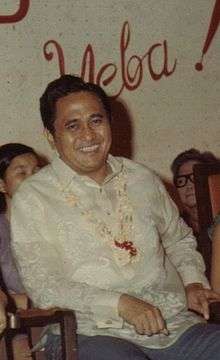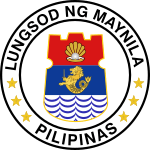Antonio Villegas
Antonio de Jesus Villegas (January 9, 1928 – November 16, 1984) was a Filipino Mayor of Manila from 1962 to 1971. His term was after the term of Arsenio Lacson as Mayor of Manila, and before the period of martial law in the Philippines.[1]
Antonio J. Villegas | |
|---|---|
 Antonio J. Villegas, Mayor of Manila, taken in 1970 | |
| 18th Mayor of Manila | |
| In office April 15, 1962 – December 31, 1971 | |
| Vice Mayor | Herminio A. Astorga (1962–1967) Felicisimo Cabigao (1968–1969) Leonardo B. Fugoso (1970) Mel Lopez (1971) |
| Preceded by | Arsenio Lacson |
| Succeeded by | Ramon Bagatsing |
| Vice Mayor of Manila | |
| In office December 30, 1959 – April 15, 1962 | |
| Mayor | Arsenio Lacson |
| Preceded by | Jesus Marcos Roces |
| Succeeded by | Herminio A. Astorga |
| Personal details | |
| Born | January 9, 1928 Tondo, Manila, Philippine Islands |
| Died | November 16, 1984 (aged 56) Reno, Nevada, United States |
| Resting place | Manila North Cemetery, Manila, Philippines |
| Political party | Liberal Party Libre'ng Pilipino Party |
Metro Manila Film Festival
In 1970, Antonio Villegas is the founder of Metro Manila Film Festival and the cinema event held every each year.
Vice Mayor of Manila
In 1959, at the age of 31, Villegas began his political career as a candidate for Manila Vice Mayor. He was elected as Vice Mayor of Manila in the 1959 elections.[1]
Tenure as mayor of Manila
After Mayor Arsenio Lacson's sudden death in 1962, Villegas quickly decreed that the first pedestrian underpass in the Philippines, located in Quiapo area of Manila, should bear the name of Lacson in his honor.[1] Construction of Lacson underpass began in 1962 and was completed in 1964.
Among the significant accomplishments of Villegas as Mayor of the City of Manila were:
- He was the first to provide a free education (with free books) from elementary to high school to the children in Manila,
- He was the first provide free college education to the poor but intellectually gifted high school graduates of the City of Manila. This free college education includes free tuition, books and uniform.
- He constructed the first free hospital in the Philippines, the Ospital ng Maynila.
- He made Manila as a non-smoking city that prohibited smoking inside the buildings, including the public transports and movie theaters.
- He started solving the traffic in Manila by:
- constructing vehicular and pedestrian underpass and overpass;
- limiting the entry in Manila of the provincial buses and freight trucks;
- initiating the use ferry boats as public transport along Pasig River (Between Del Pan near Divisoria and Guadalupe Bridge in Makati/Mandaluyong).
- Trees were planted, not only in public parks, but along the streets of Manila.
- He constructed public parks in many parts of Manila.
- He initiated the use of Filipino (based on Tagalog dialect) as the official communication in Manila.
Political career
Villegas won the Vice Mayor race in 1959 and became Manila's mayor when Lacson died in 1962 with over one year left on his term. In 1963, he ran for reelection under the Liberal Party (LP) banner and won against Nacionalista Party (NP) Congressman Roberto Oca. In 1967, he ran again for reelection and won against NP Congressman Pablo Ocampo. His victory along with his party council members in Manila was the only major victory enjoyed by the Liberal Party (LP) in 1967. All of the LP senatorial candidates except for Benigno "Ninoy" Aquino were defeated by the opposing Nacionalista Party.
In 1971, then-Congressman Ramon Bagatsing was chosen by the Liberal Party to run for Manila Mayor. Vice-Mayor Felicisimo Cabigao remained NP's bet for mayor. Villegas was left without a party. He formed the Libre'ng Pilipino Party (LPP) to run for reelection as mayor. He selected journalist J.V. Cruz to be his running mate for vice mayor. In the 1971 local election, Villegas lost to Bagatsing.
Death and legacy
After losing in the 1971 local mayoral elections to then Manila Congressman Ramon Bagatsing, Villegas and his entire family emigrated to the United States.
He remained in Reno, Nevada, until his death on November 16, 1984.[2] His coffin was exhumed from Reno cemetery and flown to the Philippines in October 1997. Memorial ceremony was held in Manila City Hall. Eulogies by the Villegas family, then-Mayor Alfredo Lim, and Senator Blas Ople were given. Villegas's body was finally buried in a plot located along the rotunda of Manila North Cemetery.[3]
Writings
- Manila, 1962: Mayor Antonio J. Villegas reports (1963)
- Building a better Manila (1963)
- Manila: Its Needs and Resources (1966)
- Dahong Alaala (1968)
- To end the reign of misery and strife ... Libre'ng Pilipino (1971)
References
- Joaquin, Nick (1990). Manila,My Manila. Vera-Reyes, Inc.
- "Villegas vs CA". Archived from the original on 2012-12-15. Retrieved 2012-01-10.
- "LIM PAYS RESPECT TO GOVERNOR-GENERAL FRANCIS BURTON HARRISON". Archived from the original on 2012-01-19. Retrieved 2012-01-10.
| Political offices | ||
|---|---|---|
| Preceded by Arsenio Lacson |
Mayor of Manila 1962–1971 |
Succeeded by Ramon Bagatsing |
| Preceded by Jesus Marcos Roces |
Vice Mayor of Manila 1959–1962 |
Succeeded by Herminio A. Astorga |

